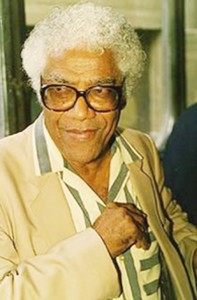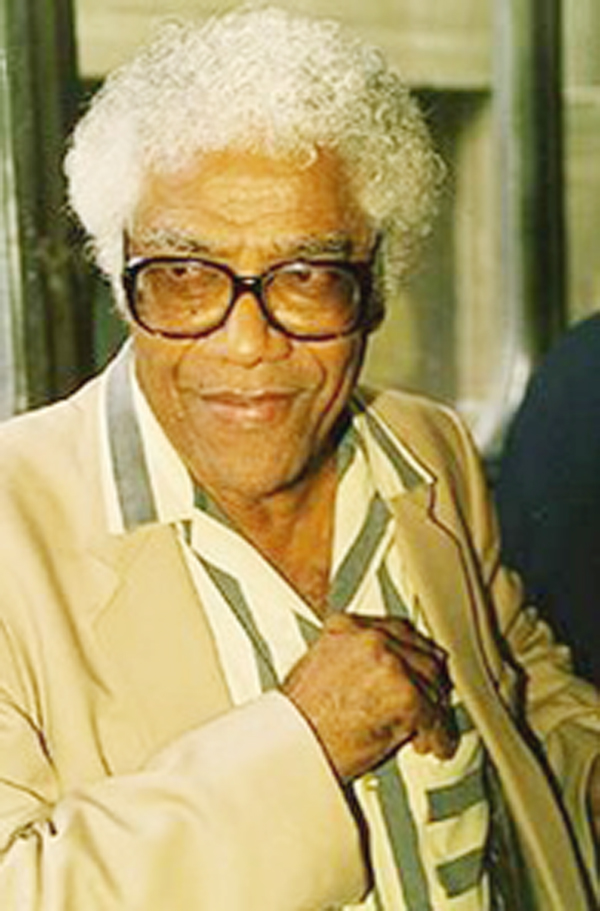Acceptance speech by Geoge Lamming on the occasion of the conferral of the Order Of The Caribbean Community
At the opening of the 29th Meeting of the Conference of Heads of Government of the Caribbean Community,1-4 July, 2008, Bolans, Antigua and Barbuda (edited copy)

I acknowledge that this is a moment of self -congratulation and I hope you will not think me subversive if I draw to your attention certain anxieties which I believe will also engage the attention of Professor Nettleford.
I believe that the mandate of the University of the West Indies in 1948 was a mandate which made it an agent for the cultural unification of the region; and it was done, I think, on the correct assumption that a cultural base, logically, gives rise to political consensus.
If you visit the Mona Campus in Jamaica today you will learn that some ninety five plus percent of the student body are Jamaicans. If you visit the Cave Hill Campus in Barbados you will learn that some eighty to ninety per cent of the student body are Barbadians. If you visit the St Augustine Campus in Trinidad you will learn that a similar proportion are Trinidadians. The University, therefore, has been suffering a gradual erosion of its regional character and we must be very careful that we may not be left with a chain of insular polytechnics.
To lose the University as an authentic body of knowledge- production and an intellectual guard in the defining of our selves as a distinct people would be a disaster too great to quantify; and that is why every conceivable investment must be made to rescue it from that possible future.
I am very much the product, like all of you, not of tradition. Our history is too short for that. In my view five hundred years is very short. But I am a product of historical contingencies and I have always turned to history to find out where I am or where I should have been; and I came across a passage from a very remarkable man called Victor Sochere- Sochere was regarded as a kind of French version of Wilberforce.
Sochere is moving up and down this region and this is what he says;
‘upon regarding the West Indian position in the middle of the ocean, glancing at the map which shows them to be always in touch with each other, one cannot help but think that they may well come together some day to form a distinct social body in the modern world. They might well unite in confederation, joined by common interests and possess a merchant fleet, an industry, arts and a literature of their own. That will not come about in a year nor in two, nor, perhaps, in a century. But come about it some day shall; for it is natural that it be so.”
Sochere is writing in 1852. This is the vision of Sochere in 1852. Therefore, as the poet Martin Carter would say, its been a long, long march from 1852 to where we are.
This theme raised by Sochere, this theme of the dormant yet organic unity of the islands of this archipelago, can be traced as far back as Oxford lectures by Merryvale on Colonization and Colonies and more intensely among ourselves for more than one hundred and fifty years. Captain Cipriani in the twenties, the Caribbean Labour Congress in the 1940’s – more creative and more visionary than succeeding political directorates have been – Montego Bay in 1947 and finally, finally the acid and blistering reminder, 1958 to 1962. I say finally, acid and blistering because in this year, 2008, we should have been celebrating the 50th anniversary of the most magnificent achievement since emancipation in 1838.
The collapse of the Federation- 1958 to 1962- was not only a humiliating failure, but, on reflection, a profound, very profound kind of betrayal.
I want to make just a few comments on what has been said so far. There is, as I go up and down this region, listening to what you call ordinary people, guessing about what you are doing here, there is, in my view, an impermissible social divide between the political classes and the populace; and that divide has led to a serious crisis in communication. My guess is that about eighty percent of the Anglophone Caribbean tonight are vaguely aware, if at all aware, of what is happening here; and that has something to do with a serious failure of communication between what I call the political classes and the general populace.
Whenever a failure occurs that failure is interpreted by their alienation from your exchanges.
It is interpreted as a betrayal, a continuing and persistent betrayal of the populace by their political classes.
Finally, I want to make a reference to President Jagdeo. It pains me very much, Mr Jagdeo, when I listen to ‘call in’ programmes where, from territory to territory, West Indians are calling West Indians foreigners. No West Indian in the Anglophone Caribbean should be seen or defined as a foreigner on any territory; and I can only attribute it to innocence that people who make these allegations of foreigner are not aware of the absolute distress which they have caused people who have invested fifty and more than fifty years of intellect and imagination in trying to eradicate that kind of awareness.
The remark by President Jagdeo that really struck me, sir, was when, from what you regarded as a serious note – which it was – you said “and now we come to the lighter side, CARIFESTA in Guyana.” I want to say, sir, with all respect, CARIFESTA is not a light matter. It may sound strange but CARIFESTA is one of the most profoundly political events this region, collectively, undertakes.
This brings me to the abuse of the word culture. Around this region the word culture has now been reduced to mean, exclusively, popular entertainment; and popular entertainment has been institutionalized by our electronic media to the point where it has almost erased completely the intellectual dimensions of our culture.
I want to say to you that we know that we cannot control the price of oil. We cannot control the quotas imposed upon us by powerful countries. But we can control how we define and present ourselves. That is the meaning of culture; the invaluable capacity to define yourself; and with that capacity to define yourself you make the one claim, whatever your size, that we could make and that is the claim of the sovereignty of the imagination.

